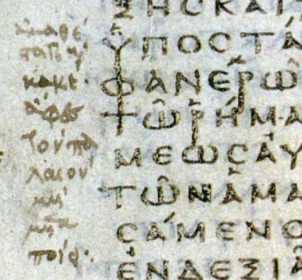Biblereader
Member
Some problems many people have with the NASB I do, too)
I do, too)
KJV:19And if any man shall take away from the words of the book of this prophecy, God shall take away his part out of the book of life, and out of the holy city, and from the things which are written in this book.
20He which testifieth these things saith, Surely I come quickly. Amen. Even so, come, Lord Jesus.
NASB:
19and if anyone takes away from the words of the book of this prophecy, God will take away his part from the tree of life and from the holy city, which are written in this book.
20He who testifies to these things says, "Yes, I am coming quickly " Amen Come, Lord Jesus.
Mark 2:17 KJV "When Jesus heard it, he saith unto them, They that are whole have no need of the physician, but they that are sick: I came not to call the righteous, but sinners to repentance."
NASB "And hearing this, Jesus said to them, "It is not those who are healthy who need a physician, but those who are sick; I did not come to call the righteous, but sinners.""
NASB leaves out "to repentance" as in Matthew 9:13. Without this reference, what is the sinner called to? It is not by accident that this change is made not just in one verse, but in each of the gospels, eliminating all together that reference to the need for repentance.
Matthew 17:21 (King James Version)
King James Version (KJV)
21Howbeit this kind goeth not out but by prayer and fasting
NASB: leaves out entirely
2 Timothy 4:22 KJV "The Lord Jesus Christ be with you. Grace be with you. Amen."
NASB "The Lord be with your spirit. Grace be with you."
NASB leaves out "Jesus Christ." So whom is the reference speaking of that is Lord? They don't want Jesus to get the honor and glory due Him, nor for you to serve Him as your Lord and Savior.
The Lord is not slack concerning his promise, as some men count
slackness; but is longsuffering to usward, not willing that any should
perish, but that all should come to repentance.
 I do, too)
I do, too)KJV:19And if any man shall take away from the words of the book of this prophecy, God shall take away his part out of the book of life, and out of the holy city, and from the things which are written in this book.
20He which testifieth these things saith, Surely I come quickly. Amen. Even so, come, Lord Jesus.
NASB:
19and if anyone takes away from the words of the book of this prophecy, God will take away his part from the tree of life and from the holy city, which are written in this book.
20He who testifies to these things says, "Yes, I am coming quickly " Amen Come, Lord Jesus.
Mark 2:17 KJV "When Jesus heard it, he saith unto them, They that are whole have no need of the physician, but they that are sick: I came not to call the righteous, but sinners to repentance."
NASB "And hearing this, Jesus said to them, "It is not those who are healthy who need a physician, but those who are sick; I did not come to call the righteous, but sinners.""
NASB leaves out "to repentance" as in Matthew 9:13. Without this reference, what is the sinner called to? It is not by accident that this change is made not just in one verse, but in each of the gospels, eliminating all together that reference to the need for repentance.
Matthew 17:21 (King James Version)
King James Version (KJV)
21Howbeit this kind goeth not out but by prayer and fasting
NASB: leaves out entirely
2 Timothy 4:22 KJV "The Lord Jesus Christ be with you. Grace be with you. Amen."
NASB "The Lord be with your spirit. Grace be with you."
NASB leaves out "Jesus Christ." So whom is the reference speaking of that is Lord? They don't want Jesus to get the honor and glory due Him, nor for you to serve Him as your Lord and Savior.
The Lord is not slack concerning his promise, as some men count
slackness; but is longsuffering to usward, not willing that any should
perish, but that all should come to repentance.








 I don't know Josh... I was aware of Bible versions well before I was saved. One of the first things I prayed was for God to lead me to truths concerning which Biblical texts would be the best to rely on. What was revealed to me with much thought of my own, was the major differences between the different texts. I was drawn towards the Byzantine family of texts. They're old and reliable. Just ask any Greek Orthodox believer. ;-)
I don't know Josh... I was aware of Bible versions well before I was saved. One of the first things I prayed was for God to lead me to truths concerning which Biblical texts would be the best to rely on. What was revealed to me with much thought of my own, was the major differences between the different texts. I was drawn towards the Byzantine family of texts. They're old and reliable. Just ask any Greek Orthodox believer. ;-)